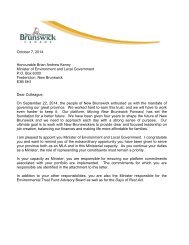cbd-ts-67-en
cbd-ts-67-en
cbd-ts-67-en
- No tags were found...
You also want an ePaper? Increase the reach of your titles
YUMPU automatically turns print PDFs into web optimized ePapers that Google loves.
Section 2: Strategies to Address the Chall<strong>en</strong>ge of Marine Debris<br />
The Regional Seas Conv<strong>en</strong>tions and Action Plans are main partners in implem<strong>en</strong>ting measures addressing<br />
marine debris at the regional level. Through a range of activities aimed at the assessm<strong>en</strong>t on distribution<br />
and sources of marine debris, and preparation of Regional Action Plans and managem<strong>en</strong>t initiatives, twelve<br />
Regional Seas programmes (Conv<strong>en</strong>tions and Action Plans) took part in the Global Initiative including<br />
Baltic Sea, Black Sea, Caspian Sea, East Asian Seas, Eastern Africa/West Indian Ocean, Mediterranean,<br />
Northeast Atlantic/OSPAR, Northwest Pacific/NOWPAP, Red Sea and Gulf of Ad<strong>en</strong>, South Asian Seas,<br />
Southeast Pacific/SPREP, and the Wider Caribbean/CEP.<br />
Marine debris is also considered a focal area of the Global Partnership on Waste Managem<strong>en</strong>t launched<br />
by UNEP in 2010 10 .<br />
The Global Partnership for Oceans led by the World Bank is a growing alliance of more than 100 governm<strong>en</strong><strong>ts</strong>,<br />
international organizations, civil society groups, and private sector interes<strong>ts</strong> committed to addressing the<br />
threa<strong>ts</strong> to the health, productivity and resili<strong>en</strong>ce of the world’s oceans. Among i<strong>ts</strong> strategic objectives and<br />
2022 goals, the partnership lis<strong>ts</strong> support for the GPA to reduce marine litter.<br />
H<strong>en</strong>ce there are a range of applicable instrum<strong>en</strong><strong>ts</strong> and frameworks at the global level.<br />
A wide range of non-governm<strong>en</strong>tal organizations (NGOs) are focusing effor<strong>ts</strong> on marine debris prev<strong>en</strong>tion,<br />
reduction, and clean up in the seas and shores, including Algalita Marine Research Foundation, 5 Gyres Initiative,<br />
International Coastal Cleanup by Ocean Conservancy, Project Kaisei, Plastic Pollution Coalition, Surfriders,<br />
Dyer Island Conservation Trust, Marine Conservation Society, World Wildlife Fund, Project Aware, and many<br />
others. The International Coastal Cleanup by Ocean Conservancy is the largest global volunteer effort to clean up<br />
beaches, but also to address the sources and distribution of marine debris globally. Recognition that the problems<br />
and solutions to issues relating to marine litter are broad and have their roo<strong>ts</strong> on land is also emphasized by the<br />
rec<strong>en</strong>t STAP report, Marine Debris as a Global Environm<strong>en</strong>tal Problem (STAP, 2011).<br />
2.1.2 National Level Responses<br />
There are hundreds of legal, regulatory and managem<strong>en</strong>t initiatives at regional, national, sub-national and<br />
community levels going on in differ<strong>en</strong>t par<strong>ts</strong> of the world. It would be chall<strong>en</strong>ging if not impossible to cover<br />
the <strong>en</strong>tire spectrum of activities aimed at solving the problem of marine debris at these levels. For illustrative<br />
purposes, some of the ongoing initiatives in a few countries are listed below, but these repres<strong>en</strong>t only a small<br />
portion of the global total:<br />
The developm<strong>en</strong>t of marine debris indicators for the European Commission Marine Strategy Framework<br />
Directive. The EU is curr<strong>en</strong>tly discussing a pilot project in the Mediterranean that would provide alternative<br />
income to local fisherm<strong>en</strong> through buy-back of collected marine debris;<br />
For more than 10 years the Practical Integrated System for Marine Debris in South Korea has be<strong>en</strong> a<br />
successful national example of an integrated and highly sophisticated infrastructure project addressing<br />
marine debris using a life-cycle approach from id<strong>en</strong>tification, waste prev<strong>en</strong>tion, deep survey, removal, and<br />
marine debris treatm<strong>en</strong>t and recycling;<br />
Other notable examples include marine debris work done by the National Oceanic and Atmospheric<br />
Administration (NOAA) and i<strong>ts</strong> partners in the United States; the Waste and Resources Action Programme<br />
of the UK and others;<br />
Doz<strong>en</strong>s of initiatives on marine debris, including plastics, are implem<strong>en</strong>ted by industries such as Operation<br />
Clean Sweep, reducing losses of resin pelle<strong>ts</strong> by American and British Plastics Industries, Waste Fishing<br />
Gear Buy-Back Project in Korea;<br />
Expand-Away-from-Home Access initiative promoting recycling in the State of California and Keep America<br />
Beautiful Initiative in the USA;<br />
Collection of discarded fishing gear on some South African coas<strong>ts</strong> and in Hawaii via NOAA/MDP.<br />
10 http://www.unep.org/gpwm/Home/tabid/79392/Default.aspx<br />
29



